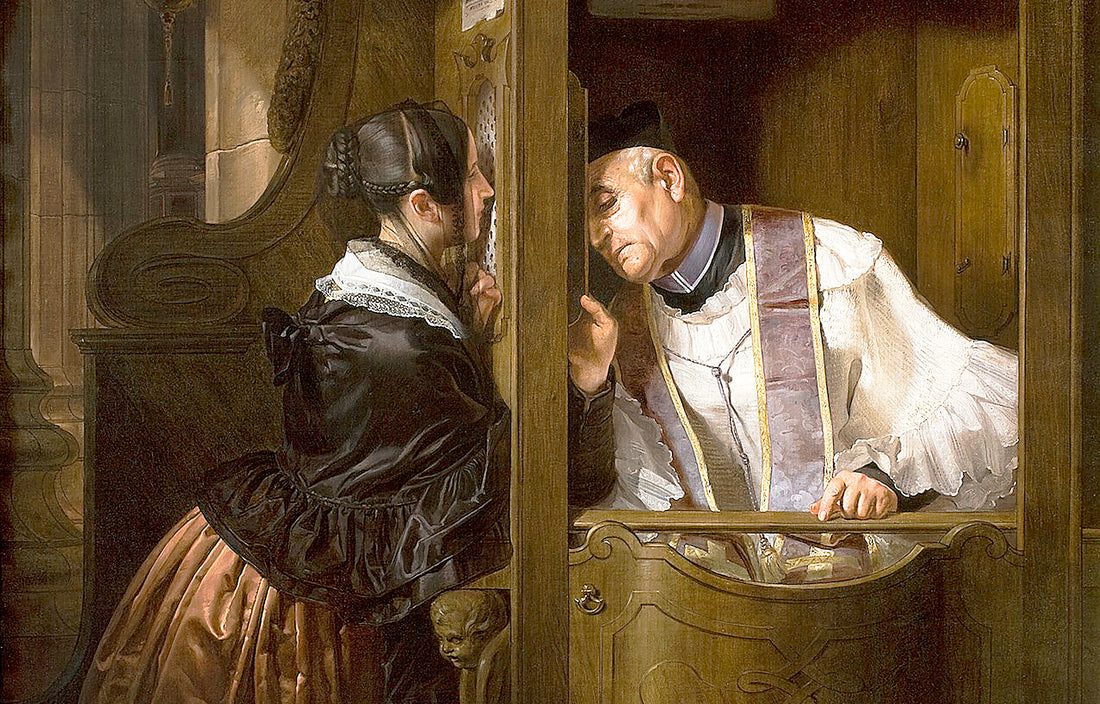In the realm of spiritual practices, the Sacrament of Penance, also recognized as the Sacrament of Confession, Reconciliation, or Conversion, presents an invaluable occasion to disclose transgressions post-Baptism. It facilitates the reception of divine grace through the sacramental absolution administered by the priest. This sacramental observance stands as an act of profound humility and a heightened consciousness of personal missteps. It offers a prospect for redemption from sins occurring after Baptism while acknowledging that the sacrament does not eradicate human frailty and the innate propensity for wrongdoing.
For evident reasons, Penance assumes a pivotal role in the spiritual journey of adherents to the Catholic faith. It is construed as an expression of profound humility and acute self-awareness, affording individuals the chance to reestablish a connection with the divine through genuine contrition and an acknowledgment of transgressions committed. This sacrament provides a conduit to liberate oneself from the weight of sins, enabling believers to access divine mercy and seek forgiveness from the Almighty. The process of reconciliation with the Church, wounded by the sins committed, metamorphoses into a journey of spiritual convalescence.
The integral components of the Sacrament of Penance encompass:
- Penitence: This transpires subsequent to an internal contemplation of conscience, constituting a moment of personal introspection centering on one's fallacies and sins. The authenticity of penitence hinges on a genuine love for God.
- Declaration: The faithful discloses sins candidly to the priest, who functions as a spiritual mentor and confidant. The clergyman concretizes divine forgiveness and fortifies the connection between the penitent and the Divine. The confession of grave sins is obligatory for a remorseful believer and represents the sole avenue for absolution. While not obligatory, the admission of lesser sins is highly recommended for the conscience to combat undesirable inclinations.
- Atonement: Subsequent to the disclosure of transgressions, the priest, serving as the divine emissary, imposes a penitential act and confers absolution, emblematic of divine pardon. Reconciliation with God and the ecclesiastical community stands as a cornerstone for spiritual renaissance and personal development.
Given the momentous nature of this ritual, every Confessor is bound by an absolute oath of confidentiality concerning the sins divulged during confession. This ensures an atmosphere of reliance and reverence, fostering believers' willingness to approach the Sacrament of Penance with the assurance of secrecy.
Rituals of Penance
In the Sacrament of Penance, the intrinsic connection between the Church minister and the penitent holds a nearly absolute significance by its very nature. Nevertheless, in exceptional circumstances, a general absolution is admissible. This is granted to multiple faithful simultaneously without requiring individual confessions. Such instances arise in situations of imminent peril where the priest lacks the time for individual confessions (as seen in times of war, natural disasters, emergencies, etc.) or when there are few confessors and a multitude of penitents, rendering individual confessions impractical within a reasonable timeframe. Those who receive a general absolution, however, must, without exception, approach individual confession as soon as the state of danger or necessity has subsided.
Rite for the Reconciliation of Individual Penitents
The rite for the reconciliation of individual penitents, alternatively known as the Sacrament of Reconciliation or Individual Confession, serves as the standard means through which the faithful can reconcile with God, encompassing various phases. Initially, the penitent engages in introspection on their sins and life, mentally and spiritually preparing for the forthcoming confession. Subsequently, they approach the priest to candidly and comprehensively confess their sins. The priest attentively hears the confession, offers spiritual guidance, and, upon the penitent's contrition, imparts absolution, proclaiming the forgiveness of sins in the name of God.
Rite for the Reconciliation of Multiple Penitents with Individual Confession and Absolution
The rite for the reconciliation of multiple penitents with individual confession and absolution allows several believers to articulate their repentance, confess personal sins, and receive individual absolution.
Rite for the Reconciliation of Multiple Penitents with General Confession and Absolution
The rite for the reconciliation of multiple penitents through general confession and absolution sees individuals expressing their repentance collectively. During this rite, penitents reflect on their individual sins, presenting themselves as a collective entity to the priest for the general confession of sins. The priest attentively listens to the collective confession, dispenses spiritual counsel, and declares absolution, signifying the forgiveness of sins for the entire assembly. The priest plays a pivotal role in this rite, serving as an intermediary between the group of penitents and the Divine. The confidentiality of the confessional is upheld, ensuring a secure environment for collective reconciliation.
